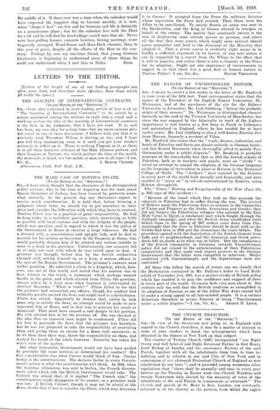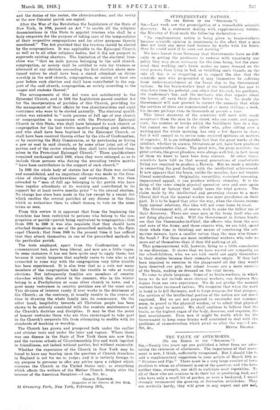THE CHURCH FRANCHISE.
[To THE EDITOR OF THE " SPECTATOR."] view of the discussion now going on in England with regard to the Church franchise, it may be a matter of interest to some of your readers to know the arrangements which have obtained in the diocese of New York on that subject.
The charter of Trinity Church (1697) incorporated "our Right trusty and well beloved and Right Reverend Father in God Henry Lord Bishop of London and his successors, Rectors of the said Parish, together with all the inhabitants from timo to time in- habiting and to inhabit in our said City of New York and in communion of our aforesaid Protestant Church of England as now established by our laws "; and it provided among numerous other regulations that " there shall be annually and once in every year forever on the Tuesday in Easter week two Church Wardens and twenty Vestrymen duly elected by the majority of votes of tke inhabitants of the said Parish in communion as aforesaid." The church and parish of St. Mary le Bow, London, are constantly referred to in the charter as the pattern from which the rights
and the duties of the rector, the churchwardens, and the vestry of the new Colonial parish are copied.
After the War of the Revolution the Legislature of the State of New York, in 1784, passed an Act " to enable all the religious denominations in this State to appoint trustees who shall be a body corporate for the purpose of taking care of the temporalities of their respective congregations and for other purposes therein mentioned." The Act provided that the trustees should be elected by the congregations. It was applicable to the Episcopal Church as well as to all other religious bodies, but it did not purport to supersede existing charters. The limitation of the electoral fran- chise was " that no male person belonging to the said church, congregation, or society shall be entitled to vote for trustees as aforesaid at any election succeeding the first election above men- tioned unless he shall have been a stated attendant on divine worship in the said church, congregation, or society at least one year before such election and shall have contributed to the sup- port of the said church, congregation, or society according to the usages and customs thereof."
The arrangements of this Act were not satisfactory to the Episcopal Church, and in 1801 the Legislature passed another Act for the incorporation of parishes of this Church, providing for the management of their affairs by two churchwardens and eight vestrymen who were to be elected annually. The electoral qualifi- cation was extended to " male persons of full age of any church or congregation in communion with the Protestant Episcopal Church in this State, who shall have belonged to such church or congregation for the last twelve months preceding such election, and who shall have been baptised in the Episcopal Church, or shall have been received therein either by the rite of Confirmation, or by receiving the Holy Communion, or by purchasing or hiring a pew or seat in said church, or by some other joint act of the parties and of the rector whereby they shall have attached them- selves to the Protestant Episcopal Church." These qualifications remained unchanged until 1868, when they were enlarged so as to include those persons who during the preceding twelve months " have been contributors to the support of such church."
In 1895 the whole body of statute law of the State was revised and consolidated, and an important change was made in the fran- chise of electing churchwardens and vestrymen. It was then extended to " men of full age belonging to th3 parish who have been regular attendants at its worship and contributed to its support for at least twelve months prior " to the annual election. No change has since been made in the law except by a recent Act which enables the several parishes of any diocese in the State which so authorizes them to admit women to vote on the same terms as men.
From this review it is apparent that from the beginning the franchise has been restricted to persons who belong to the con- gregation or parish—parish being equivalent to congregation; that from 1801 to 1868 it was also requisite that they should have attached themselves in one of the prescribed methods to the Epis- copal Church; that from 1868 to the present time it has sufficed that they attach themselves in one of the prescribed methods to the particular parish.
The tests employed, apart from the Confirmation or the communicant test, have been liberal, and now are a little vague. In some instances it has not been quite easy to apply them; but because it rarely happens that anybody cares to vote who is not connected in some way with the congregation very little trouble has been experienced. It is also true that as a rule not many members of the congregation take the trouble to vote at vestry elections. Not infrequently families are members of country churches which they attend in the summer, who in the winter belong to a Presbyterian or some other church in town, and a good many vestrymen in country parishes are of the same sort. This division of interest rarely if ever works to the detriment of the Church; on the contrary, it usually results in the course of time in drawing the whole family into its communion. On the other hand, hospitality towards all Christian people has been shown to be entirely consistent with the resolute maintenance of the Church's doctrine and discipline. It may be that the point of honour restrains those who are thus encouraged to take part in the Church's corporate life from attempting to meddle with its standards of teaching or worship.
The Church has grown and prospered both under the earlier and stricter tests and under the later and vaguer. Where there was one diocese in the State of New York there are now five; and the various schools of Churchmanship live and work together in friendliness, not indeed without parties, but without animosity.
Whether the experience of the Church in New York may be found to have any bearing upon the question of Church franchise in England is not for me to judge; and it is entirely foreign to my purpose to presume to offer any advice upon a subject which concerns the Church in the United States only, as everything which affects the welfare of the Mother Church deeply stirs the interest of the American Daughter.—I am, Sir. &c.,
GEORGE ZABRISKIE,
Chancellor of the Diocese of New York.
23 Gramercy Park, New York, February 12th.



























 Previous page
Previous page